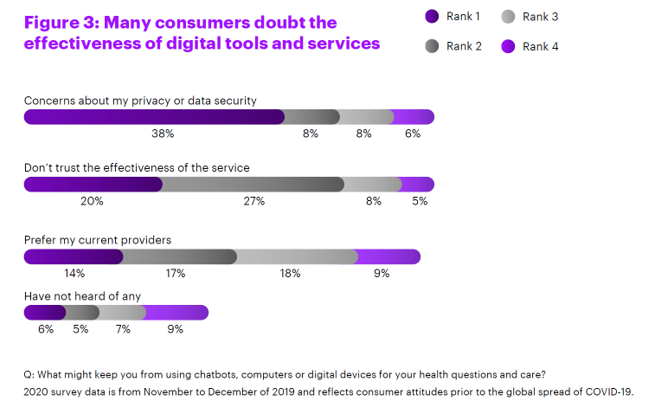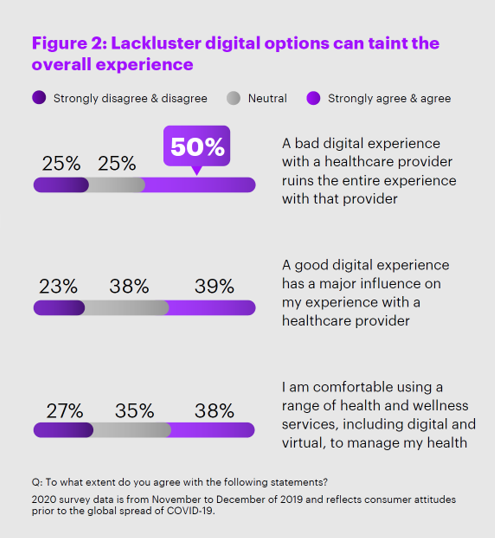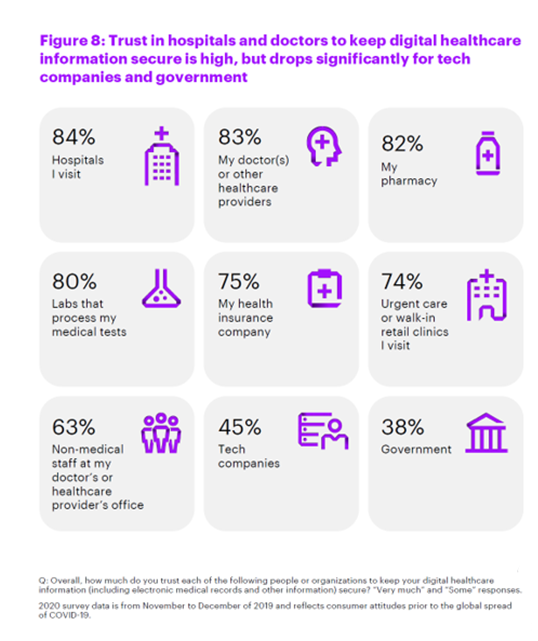“Digital transformation” was the mantra for all industries before we heard about the COVID-19 virus. Since the emergence of the pandemic, the coronavirus has accelerated the adoption of digital platforms, AI, and ecommerce. That is at least as true for the health care sector as it has been for other industry segments.
So, will the fast-adoption of virtual care and other forms of digitization in health care last? Accenture probes this question in a report published today asking, How Can Leaders Make Recent Digital Health Gains Last?
 In Accenture’s words, “COVID-19 forced a surge” in virtual health care following a stalling of consumers’ adoption of digital health in late 2019: by December 2019, 35% of consumers had been using mobile health apps on phones and tablets, down from 48% in 2018; and 18% of consumers int he U.S. had adopted wearable technology for health tracking, a nearly 50% decline from 2019 (from 33% in 2018 to 18% in late 2019).
In Accenture’s words, “COVID-19 forced a surge” in virtual health care following a stalling of consumers’ adoption of digital health in late 2019: by December 2019, 35% of consumers had been using mobile health apps on phones and tablets, down from 48% in 2018; and 18% of consumers int he U.S. had adopted wearable technology for health tracking, a nearly 50% decline from 2019 (from 33% in 2018 to 18% in late 2019).
The pandemic drove U.S. patients to seek medical counsel outside of brick-and-mortar doctor’s offices and hospital clinics: Accenture points to a 2,000% increase in visits to Amwell telemedicine platforms between January and March 2020, and a 900% growth in the use of telehealth services with Banyan Medical Systems.
These establish a new baseline on the health consumer demand side for virtual care.
What factors could limit this exuberance which was rational in the first months of the pandemic in the U.S.?
 In response, Accenture points to consumers’ lackluster experiences with both the technology and clinician interactions.
In response, Accenture points to consumers’ lackluster experiences with both the technology and clinician interactions.
50% of consumers said a bad digital experience with a health care provider ruins the entire experience with the provider, shown in the table.
On the other hand, 39% of people said a good digital experience has a major influence on my experience with a healthcare provider.
Not the differential power of a negative experience versus a positive experience: more people said a negative experience would “ruin the entire experience” with a provider than people saying a positive experience would benefit their relationship with the provider.
Still, nearly 4 in 10 health consumers said they are comfortable using a range of health and wellness services including digital ones to manage their health.
Beyond experience, questions about privacy, security, and the technologies’ effectiveness threaten the future persistence of digital health.
U.S. consumers’ top-ranked concern about using a digital health tool like a chatbot, computer, or device for their health questions can is privacy and data security, followed by lack of trust in the effectiveness of the technologies.
In the context of accessing health through these technologies, 35% of U.S. consumers were not confident their data would be appropriately used.
 Health Populi’s Hot Points: While COVID-19 and consumers’ general embrace of technology in daily life fan the development flames of digital health innovations, consumers will trust health platforms coming from some sources more than others.
Health Populi’s Hot Points: While COVID-19 and consumers’ general embrace of technology in daily life fan the development flames of digital health innovations, consumers will trust health platforms coming from some sources more than others.
The top-trusted channel for digital health security was doctors and other health care providers like hospitals, pharmacy, and clinical labs.
The least-trusted sources for digital health information security were technology companies and government.
Thus, Accenture concludes with the observation that, “getting doctors to sustainably buy into digital health could have a big impact on adoption.”
We’ve seen in the past several years that physicians’ recommendations for digital health apps, and even “prescriptions” for exercise and food-as-medicine, get more traction and adherence by patients than those direct-to-consumer products and services bypassing a clinician’s voice of support or advocacy.
This may vary by generation, with younger people tending to trust tech companies more than older people. But the advice from Accenture is sound: trust in science and evidence-based recommendations would be important for telehealth’s sustainable model past the pandemic.
Trusted care providers motivate consumers to manage their health, Accenture found in the survey, all above financial incentives to the consumer, convenient access to care, and personalized information about what to do to stay healthy.
Most consumers are willing and open to receiving virtual care from their own providers, from retailers and tech companies. Forging trust and proving out the evidence/effectiveness base for the services cannot be overlooked if virtual care and “hand-held health” is to survive as a business model, post-pandemic.





 Grateful to Gregg Malkary for inviting me to join his podcast
Grateful to Gregg Malkary for inviting me to join his podcast  This conversation with Lynn Hanessian, chief strategist at Edelman, rings truer in today's context than on the day we recorded it. We're
This conversation with Lynn Hanessian, chief strategist at Edelman, rings truer in today's context than on the day we recorded it. We're